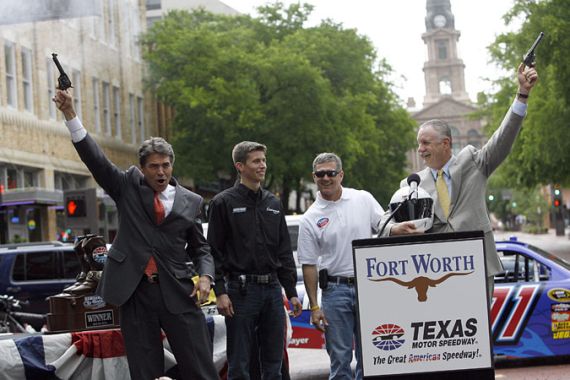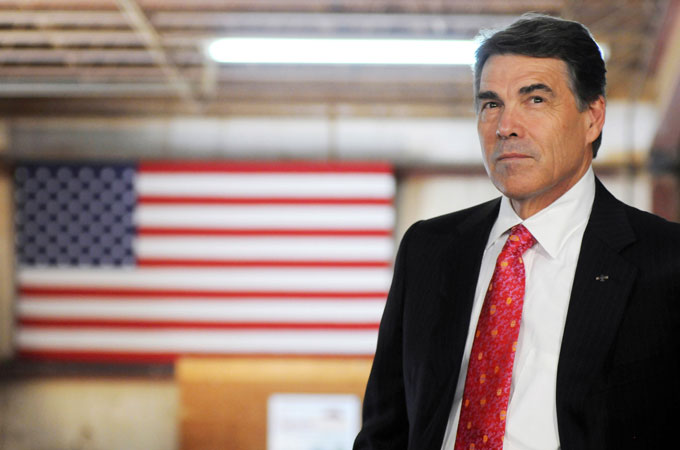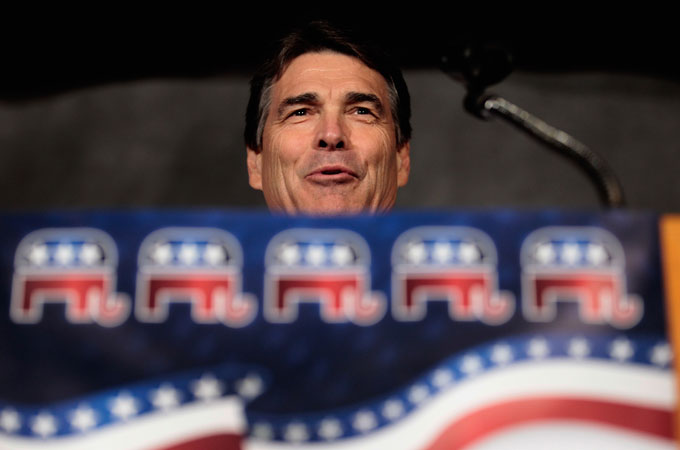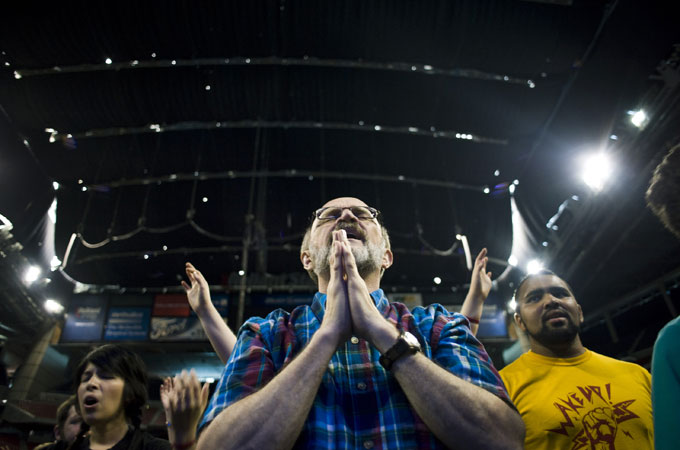Rick Perry: Too big to fail?
As the race for the US presidency begins, another Texas governor has emerged as a leading contender.

 |
| Texas Governor Rick Perry’s quest for the White House is enabled by the fact that President Obama is saddled with a massive economic crisis and two unpopular wars in Iraq and Afghanistan [GALLO/GETTY] |
The dilemma facing American voters as the 2012 presidential election season begins might be summed up in one colourful question:
“Is America ready for another set of cowboy boots in the White House?”
The man posing the question is Ross Ramsey, managing editor of The Texas Tribune. The boots belong to Texas Governor James Richard “Rick” Perry, an undefeated conservative darling and gubernatorial successor to George W Bush, who’s hoping his skill at rallying dissatisfied Republicans and the religious right can propel him into the White House.
Perry, the longest-serving governor in Texas history, and currently the longest continuously serving governor in the US, believes he can secure the Republican Party nomination and ultimately become the next US president by defeating President Barack Obama in the 2012 presidential election.
His quest is facilitated by the fact that President Obama is saddled with a massive economic crisis and two unpopular wars in Iraq and Afghanistan.
Recent polling data suggest his boots may well end up in the White House if current trends continue.
A Public Policy Polling survey published August 23 found Perry with a commanding double-digit lead over Republican contender Mitt Romney, while an August 22 Gallup poll found Perry tied with Obama.
Another Texas newsman, San Antonio Express News political columnist Scott Stroud, warns that Perry is an electoral force to be reckoned with.
“He’s a very talented politician,” Stroud told Al Jazeera. “He’s never lost, and should never be underestimated.”
Perry won a campaign against the better-funded and immensely popular Texas Senator Kay Bailey Hutchison in 2010 because of his ability to mobilise voters. In 2002, he was heavily outspent by Democratic opponent Tony Sanchez, but he won that race as well.
His ideas can be controversial. Speaking at a Tax Day protest in 2009, Perry infamously flirted with the idea of a Texan secession from the US. What was widely regarded as a faux pas, however, now appears to have assisted Perry in garnering support from the Tea Party.
Analysts confirm that Perry’s frequent gaffes haven’t necessarily hurt his presidential prospects.
“His chances for the Republican nomination look very good,” Jake Silverstein, the editor of Texas Monthly magazine, told Al Jazeera.
“It’s very clear the high expectations for his entering the race have played out, because the evidence is in the polls, it’s in how others are having to respond to try to mute his impact. There’s no question he’s quickly established himself as the candidate to beat.”
Ramsey sees Perry as a viable candidate with broader appeal than the rest of the contenders.
“If you do the checklist for Perry: he’s a fiscal and social conservative,” he said. “He’s Christian with ties to the evangelical community. He’s one of the first in Texas politics to appeal to the Tea Party. He’s from the South. He’s good looking, and he speaks well,” Ramsey said. “None of the other candidates appeals on all these counts.”
The 61-year-old Perry, a fifth-generation Texan, was born near the city of Abilene and graduated from Texas A&M University in 1972 with a 2.2 GPA and a BA in animal science. He went on to fly C-130s in the Air Force and attained the rank of Captain before returning to Texas in 1977.
Elected to the Texas House of Representatives as a Democrat in 1984, Perry supported Al Gore in the 1988 Democratic presidential primaries and chaired Gore’s campaign in Texas. In a fairly blatant display of political opportunism, he spontaneously joined the Republican Party in 1989, and in later years went as far as to describe himself and Bush as “philosophical soulmates”.
Perry’s ideological consistency is further cast into doubt if one juxtaposes his reflection on his time in the Air Force, when he reportedly “realised not everyone values life the way we [in the US] do”, with the fact that he has succeeded in executing more people in the state of Texas than Bush.
Perry is a self-proclaimed fiscal conservative who opposes abortion. He has run campaigns promising to be tough on crime, and in 2006 stated that he believes in the inerrancy of the Bible and the notion that those who do not accept Jesus Christ as their saviour will go to hell.
Perry’s campaign moves have become a source of near-constant criticism for many Texas newspapers and columnists.
“His campaign strategy, as best I understand it, is to open up roughly one can of crazy per day,” Stroud has written.
“He breezily dismissed the science behind global warming. And he told a little kid in New Hampshire that we teach creationism in Texas public schools, even though it’s unconstitutional to do so.”
Wayne Slater, senior political writer for the Dallas Morning News, commented on Perry’s appeal to Christian extremists and other radicals in order to shore up his political base: “The problem for Perry is, if he wins the Republican nomination, what does he tell general election voters who remember him cavorting with Birthers and Birchers and secessionists and dominionists and Christian Zionists? And I think that might be a problem.”
According to Perry’s campaign, the governor’s achievements include being the direct cause of an ongoing economic boom in Texas.
Euphoria over the “Texas Miracle”, as it is often called, points to half of all US job growth in the last two years having taken place in Texas. Texas’ unemployment rate (8.4 per cent) is lower than the overall US rate (9.1 per cent), and 210,000 jobs were created there last year, more than in any other US state.
What Perry’s campaign neglects to mention, however, is that at least 37 per cent of those 210,000 jobs are either at or below federal minimum wage, and that the unemployment rate in the state is the highest it has been since 1987.
The Perry camp has also failed to explain why Texas is beset with myriad other economic maladies, such as that 30 per cent of Texans – more than 6 million people – are uninsured, and that the state is facing a $4.3bn budget deficit this year alone.
In one of his most recent public blunders, Perry made a veiled threat of violence towards Federal Reserve Chairman Ben Bernanke.
“If this guy prints more money between now and the election, I dunno what y’all would do to him in Iowa, but we would treat him pretty ugly down in Texas,” he said earlier this month.
As for other incidents highlighting Perry’s regard for the law, he responded to a state trooper who pulled him and an aide over for speeding in 2000 by attempting to use his political office to dissuade the officer from writing a ticket: “Why don’t you just let us get on down the road?” The incident was captured on state trooper video.
Other inauspicious video footage was meanwhile recorded following a television interview with Perry in 2005, when the governor – thinking he was off-camera – derogatorily mimicked the reporter who had been interviewing him and added the less-than-endearing farewell: “Adios, mofo.”
Texas as national model?
During his campaign for the 2000 presidency, George W Bush pledged to do for the nation what he had done as governor for the state of Texas. Following in Bush’s footsteps, Perry is peddling the notion of an economic boom in the Lone Star State.
But ample statistics refute his economic promises.
Compared to other US states, Texas ranks 44th in home ownership and 50th in affordability of home insurance, and has the highest rate of families without health insurance.
The state ranks first in the number of workplace fatalities and minimum wage workers, and 50th in workers compensation coverage. It also has the highest rate of workers earning either minimum wage or less, and the lowest average personal credit scores. In 2010, Texas ranked last in the percentage of adults with high school diplomas.
Under Perry’s leadership, Texas has cut funding from public schools and pre-kindergarten programs for 100,000 low-income children.
The Texan reputation has been indisputably soured by Bush, and Perry has begun to take heat for his own gaffes. Even so, some observers do not consider the resulting criticism and stereotypes of Texas, or of Perry, as necessarily unique or detrimental to his presidential bid.
“Texas has its own special craziness, but I’m not so sure it’s so different from the rest of the country,” Robert Jensen, professor at the School of Journalism at the University of Texas at Austin, told Al Jazeera.
“My problem is not that I live in Texas, but that I live in the US. To me Rick Perry isn’t unusual.”
According to Jensen, Perry doesn’t necessarily stand out when compared to other GOP figures like Michelle Bachman, who is ideologically more extreme, or Romney, whom he says is “not exactly the picture of political sanity”.
Jensen believes that the US has shifted so far to the right politically since the 1970s that what was once referred to as the reactionary right wing has become an acceptable portion of the Republican party powerbase.
“I think there are two countries in the developed world that are essentially lunatic societies, meaning that they are unhinged from reality,” Jensen said. “And these are the US and Israel. They’ve been riding high for so long, they’ve lost touch with reality. A big part of the Israeli political spectrum can’t cope with reality and won’t recognise it, and the same is true in the US.”
Jensen attributes the viability of Perry’s candidacy to this “lunatic” context.
Texas Observer reporter Abby Rapaport meanwhile believes that, despite his shortcomings, Perry has an excellent campaign strategy.
“He wrote the playbook on political organising back in 2010, when he created an expansive grassroots network”, Rapaport said, adding that Perry benefits from the media’s failure to closely analyse the claims made by his campaign.
As Ramsey pointed out, however, Perry has virtually no foreign policy experience, an effect of his “having always been a state official”.
‘A crippled president’
Jensen, Silverstein, and Ramsey are among an increasing number of pundits who think Perry stands a good chance in a presidential race against Obama, particularly given that Obama is now widely associated with crises at home and abroad – on Wall Street and in Iraq and Afghanistan.
“Anybody up against Obama right now has a chance of wining,” Jensen said. “I would have a chance of winning [against Obama].”
Silverstein believes Perry’s “keen instincts, discipline, and his ability to capitalise on the dynamics of whatever election he finds himself in” make him a powerful campaigner. “He’s been successful over and over and over
 |
| Rick Perry has never lost an election [GALLO/GETTY] |
again. Perry is a serious candidate and a serious politician. He’s not a cardboard cutout,” he added.
Ramsey said that, while it’s too early to make predictions about the 2012 election, “If they had the election today, I think Obama would lose.”
Jensen blames the economic meltdown and the unpopular occupations of Iraq and Afghanistan for Obama’s low ratings, as well as the issue of race: “There are a lot of white people in the US who don’t want to vote for him simply because he’s black.”
He goes further: “Perry is running against a crippled president.”
Jensen sees Perry as the “presumptive favourite” for the Republican nomination, as current polls suggest.
“The only question is can he raise money on a national scale, and now it looks like he might be able to. I think he is the favourite over Romney, and the rest of the Republican field is irrelevant. So barring the emergence of a major Republican sensation, and barring a Perry meltdown, I’d say he’s the presumptive nominee.”
Perry’s fundraising capability already appears strong.
The differences between campaign finance rules in Texas and those for the federal system mean top donors who are used to giving Perry’s state campaign hundreds of thousands of dollars are now limited to only $2,500 for his presidential run.
But those same people are now able to collect donations from their own network of donors in a system known as “bundling” that was perfected by the younger Bush.
Bush had 900 bundlers, and Perry is already expected to generate a much larger network than that.
In addition to the bundlers, Perry already has at least seven Super PACs (Political Action Committees) up and running, which can receive unlimited donations from individuals and corporations and use the money to advocate for a candidate.
Perry as prophet
In early August, Perry hosted a seven-hour Christian prayer rally in Houston called “The Response: A Call to Prayer for a Nation in Crisis”, which drew approximately 30,000 people.
“Father, our heart breaks for America,” he prayed before the crowd. “We see discord at home. We see fear in the marketplace. We see anger in the halls of government. And as a nation, we have forgotten who made us, who protects us, who blesses us. And for that, we cry out for your forgiveness.”
The event, held at Houston’s Reliant Arena, was broadcast on cable Christian channels across the US, on the internet, and in at least 1,000 churches.
Jensen is concerned by Perry’s massive prayer event because of the intentional melding of politics and religion, although Perry’s campaign was quick to deny that this was the goal of the activity.
“This statewide prayer he did is troubling,” he said. “It was not only exclusively Christian, it was a particular right-wing evangelical brand of Christianity. There are reasons to be nervous about that. The nature of the faith and the way it’s deployed is concerning, because Perry appears to be willing to play politics with religion.”
The event was organised by a Christian fundamentalist evangelical group known as The Call, which
 |
| Tens of thousands attended an August 6 prayer and fasting event organized by Gov. Rick Perry in order to pray for God to help save ‘a nation in crisis’ – referring to the US [GALLO/GETTY] |
encompasses self-proclaimed prophets from a movement known as the New Apostolic Reformation. These groups emerged as early supporters of Perry, and pushed for him to run for president. In keeping with his tradition of political opportunism, Perry has indiscriminately welcomed such extremists into his political flock.
In a revealing moment in June, Perry compared himself to a religious leader while defending himself against Texas critics on Fox, informing host Neil Cavuto that “a prophet is generally not loved in their hometown”.
Perry’s public displays of faith are compounded by other troubling facts about his home state.
The Texas Education Code doesn’t require public schools to teach sex education at all, and one study found that 94 per cent of Texas schools teach abstinence-only sex education.
Perhaps as a result of this, Texas has the third-highest teen birth rate in the nation, and it costs taxpayers roughly $1b every year.
Texas also leads the country in executions, and Perry vetoed a bill that would have prevented mentally disabled people from being executed.
Stroud feels these and other issues could well come back to haunt Perry as he gains more national attention and scrutiny.
“There are a lot of people who put him in the top tier [of candidates],” he said. “But they haven’t checked him out yet. He’s prone to critics because he can be painted as a scary guy.”
Perry for President?
Gaffes, controversy, and criticism aside, if Perry wins the Republican nomination, he may be poised to make a strong run for president.
“You can’t underestimate Rick Perry and his campaign team,” Rapaport said, “They are incredibly creative and responsive.”
But Ramsey wonders if Perry is “too Texan” for the rest of the country, and whether he might prompt negative flashbacks to Bush among the general populace.
Silverstein extols Perry’s odds against Obama, although he sees the economy playing a critical role in the 2012 vote.
“A few weeks ago the Democrats were quick to write Perry off as a general election candidate, due to American voters having Bush-fatigue and that national voters won’t elect another governor from Texas,” he said.
“But I don’t think those will be deciding factors in whether Perry can compete in a general election. The country’s dynamics today are so intense they kind of obliterate any Bush hangover that would have affected Perry.”
“We [at Texas Monthly] have tracked every race Perry has run,” Silverstein added.
“And he’s never lost a race.”
Follow Dahr Jamail on Twitter: @DahrJamail